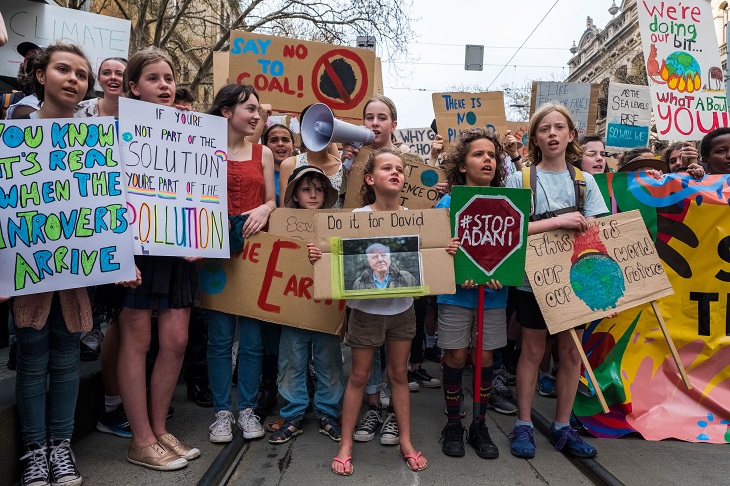Forced schooling has had over a century to prove its worth and has been an utter failure to the wellbeing of children and society. Why, then, do we continue with this disastrous experiment? Simply put, the purpose of forced schooling is not to educate children, but to create a manageable population of citizens who will be predictable, compliant cogs in the economic machine.
Our state governments coerce parents into sending their children to school with threats of hefty fines and imprisonment. According to those making the threats, this is for our wellbeing. Children must be confined to small, crowded classrooms for almost six hours a day, five days a week, for twelve years, to become proficient at reading, writing, and arithmetic and attain a basic knowledge of subjects such as history and science. This is clearly absurd, and all the evidence reveals that the literacy skills, reasoning abilities, and emotional wellbeing of our children are declining with each passing year, yet we persist with this experiment.
Many students finish school without attaining what used to be considered a basic grasp of grammar. By every discernible measure, forced schooling is an abject failure, but it is a staple of our political and economic system, hence few people question it (or, if they do, it’s when they are at school, where they are told doing so is misbehaviour).
A society that allows genuine debate would re-evaluate compulsory schooling. As former three-time New York City Teacher of the Year John Taylor Gatto observed, school reform is impossible because schools do what they were always intended to do. After all, a population of genuinely well-educated, self-sufficient, imaginative people would be dangerous to the status quo, which wants us dependent on ‘experts’ for permission to do anything.
Before forced schooling, people learned how to read, write, and do arithmetic in far less than twelve years, as well as how to prepare meals, manage finances, develop a work ethic and manners, grow food, treat wounds, have a conversation, build a shelter or a house, and so on. They learned the practical skills of life. To quote the science-fiction author Robert Heinlein, ‘A human being should be able to change a diaper, plan an invasion, butcher a hog, conn a ship, design a building, write a sonnet, balance accounts, build a wall, set a bone, comfort the dying, take orders, give orders, cooperate, act alone, solve equations, analyse a new problem, pitch manure, program a computer, cook a tasty meal, fight efficiently, and die gallantly.’ A lofty ideal, but you get the point. Ask any bored student in any classroom the reason for their disinterest and they’ll tell you they don’t see any practical value in what they’re being forced to memorise. They’re right.
Forced schooling is particularly hostile to boys, who desire to master themselves and their environment and yearn for adventure. School punishes expressions of these innate masculine desires, to the point of requiring them to raise their hands to exercise their right to go to the bathroom.
In his 1992 book Dumbing Us Down, John Taylor Gatto argued that forced schooling is antithetical to true education, and it is intended to be. A true education, he said, cultivates self-mastery and a sense of individual calling (the Church calls this ‘vocation’). Every child has unique interests and gifts, the cultivation of which fosters a love of learning and contributes to their personal flourishing and the common good. Gatto wrote, ‘Children learn what they live. Put kids in a class and they will live their lives in an invisible cage, isolated from their chance at community; interrupt kids with bells and horns all the time and they will learn that nothing is important…’ Today, most children’s time is spent at school, on the Internet, or on the Internet at school, meaning they have little time for privacy and reflection, which are both necessary for personal growth.
On the constant ringing of bells, Gatto wrote, ‘[schooling] is psychopathic – it has no conscience. It rings a bell and the young man in the middle of writing a poem must close his notebook and move to a different cell where he must memorise that humans and monkeys derive from a common ancestor.’ The way forced schooling conceptualises learning is incoherent. The most fundamental questions of philosophy and theology, such as what it means to be a human being, remain unexplored, so there is no discernible reason for children to be doing what they are required to do beyond its apparent necessity for finding a job (which often isn’t the case). It reduces education to memorising disparate factoids to be recalled for the standardised tests that will determine the child’s worth, and trains children to never do anything without an authority figure’s permission, regardless of whether said figure knows what they are talking about.
Even if one wishes to defend forced schooling, one should be able to see that twelve years spent within school walls is too long. Mary Shelley published Frankenstein at the age of twenty. By then she was married and had given birth to, and experienced the death of, her first child. She had little formal education as a child, but was tutored by her father. Blaise Pascal wrote a significant treatise on projective geometry when he was sixteen. One wonders whether their talents would have been smothered by our modern education system…
Forced schooling artificially prolongs childhood and creates a population of homogenous citizens who are masters of nothing. Anyone who has made a great success of their life has done so despite, not because of, forced schooling. Genius does not only reside in the children of the wealthy, it also lies latent in children from poor families who rarely get the opportunity to cultivate their potential. Like John Calvin’s concept of God, forced schooling designates much of the population as reprobate and treats them as such. The boy who wants to draw comic books must suspend his efforts and memorise facts from a science textbook. The girl who dreams of becoming an elite tennis player must largely relegate her training to after school hours, as work she isn’t interested in absorbs most of her time. We ought to seek alternatives to forced schooling and help children nurture their unique instincts.
Think about your favourite teacher from school (if you have one). No doubt most of your schoolteachers have faded into the recesses of your memory, never to be recalled again, but someone usually stands out. Why? It’s likely because they took a personal interest in you and recognised your unique talents and interests, making the curriculum personally relevant to you. They sensed your potential and believed in you rather than merely repeating curriculum talking points. They also probably displayed a deep knowledge of and love for their subject, giving you an example to emulate. Such examples are the exception, not the rule, in public schools.
The problem is a complex one, but Gatto suggests, ‘Some sort of free-market system in public schooling … a free market where family schools and small entrepreneurial schools and religious schools and crafts schools and farm schools exist in profusion to compete with government education … a free market in schooling exactly like the one the country [America] had until the Civil War, one in which students volunteer for education that suits them even if it means self-education. It didn’t hurt Benjamin Franklin that I can see.’ Of course, this would threaten the state’s monopoly of our minds.
Is it needful to remind readers that, at this point, public schools are merely progressive indoctrination facilities? Your child, separated from his family, could be encouraged by their activist teacher, or some other deranged authority figure, to switch genders. A document from the South Australian Department of Education reads, ‘When parents make it clear they do not support their child’s gender affirmation, the site leader must decide what is in the best interest of the child or young person.’ What gives this taxpayer-funded ‘site leader’ the right to override parental authority? The modern public school is a battlefield for your child’s mind.
Is it any wonder that Karl Marx’s tenth measure outlined in The Communist Manifesto for achieving communism was, ‘Free education for all children in public schools. Abolition of children’s factory labour in its present form. Combination of education with industrial production…’ Marx wanted children removed from the protection of their parents and schooled by the state to achieve the destruction of the family, which he viewed as a bourgeois institution. This was radical at the time, but we now readily accept forced schooling because the state has enforced it for so long. As the proverbial fish in the fishbowl doesn’t notice water, so we don’t notice how insane forced schooling is because it shapes our cultural imagination.
Forced schooling has had long enough to prove its worth. It’s time to end this mad experiment. A free market of education and ideas is more conducive to children flourishing, whereas forced schooling is a means of repression and social control. With the deliberate advancement of progressive ideology in our education system, we must get our children out of schools and help them receive real education. As Gatto said, ‘There isn’t a right way to become educated; there are as many ways as there are fingerprints.’ Of course, the free-market approach would prove inconvenient for the state and its ‘experts’, meaning it won’t be easy. Most worthwhile endeavours are not.
Got something to add? Join the discussion and comment below.
Get 10 issues for just $10
Subscribe to The Spectator Australia today for the next 10 magazine issues, plus full online access, for just $10.


























Comments
Don't miss out
Join the conversation with other Spectator Australia readers. Subscribe to leave a comment.
SUBSCRIBEAlready a subscriber? Log in